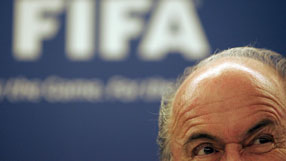
"This is a strategy which could be extremely beneficial in the next few years," WADA president John Fahey told reporters after meeting his opposite number Sepp Blatter at FIFA headquarters on Thursday.
"We welcome this partnership and we are happy that such an important sport is prepared to work with us," he added, although he warned it could take time to implement.
"It will not necessarily bring results straight away."
Since January 2008, the International Cycling Union (UCI) has collected blood samples from all professional riders to create a medical profile that would be compared with data registered in anti-doping tests.
"This is a long-term project and it's worthwhile exploring," said FIFA chief medical officer Jiri Dvorak, adding that FIFA carried out 33,000 doping tests each year.
"Of these, 0.3 percent test positive and these are mostly with social drugs such as marijuana and cocaine," said Dvorak. He said 0.03 percent of the 33,000 tested positive for positive for performance-enhancing drugs.
FIFA and WADA were until recently involved in a series of disputes, mainly over the controversial whereabouts rule which requires athletes to give three months' notice of where they will be for an hour each day.
The best features, fun and footballing quizzes, straight to your inbox every week.
However, the two sides have patched up their differences and Fahey said FIFA was now up to scratch with WADA regulations.
"FIFA has a robust and extensive anti-doping programme and ... is fully compliant with the World Anti-Doping committee," he said. "The FIFA programme is a very good programme."
FIFA president Blatter said the sport was doing all it could.
"I was too candid when I said there are no drugs in football," he said. "33,000 (tests) is the optimum. We can't do more than that."
